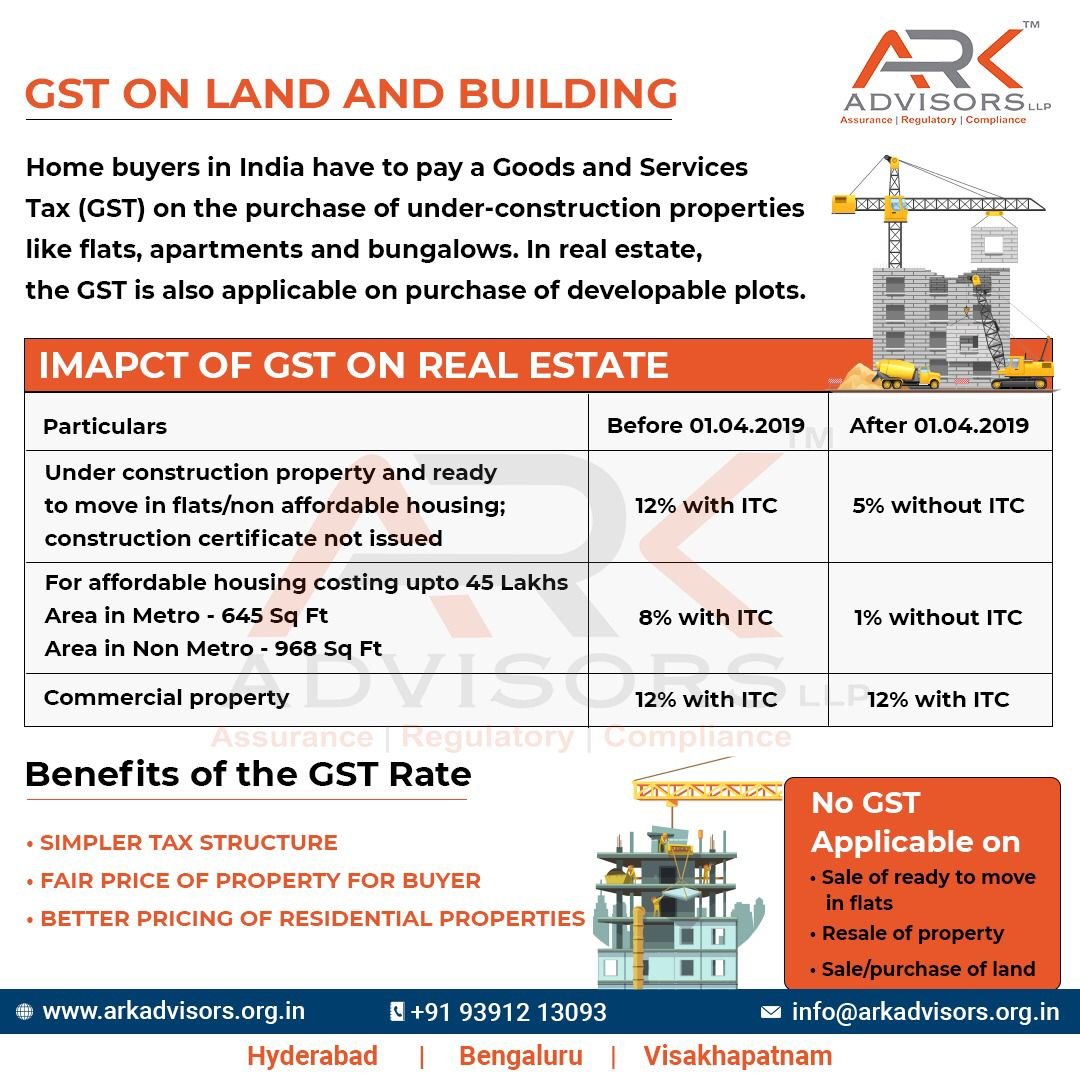GST on Land & Building :
At the 33rd GST Council Meeting held on 24th February 2019, new GST rates have been introduced for residential real estate which will come into effect from the 1st of April 2019. The new GST rates on residential real estate transactions have been proposed as follows:
- GST to be charged at 5% without Input Tax Credit (ITC) on residential properties that are not part of the affordable housing segment.
- GST to be charged at 1% without ITC on residential properties that are included in the affordable housing segment.
As per Schedule II of CGST Act 2017, Construction (including additions, alterations, replacements or remodelling of any existing civil structure) of a complex, building, civil structure or a part thereof, including a complex or building intended for sale to a buyer, wholly or partly, except where the entire consideration has been received after issuance of completion certificate, where required, by the competent authority or after its first occupation, whichever is earlier is Supply of Service.
Accordingly, construction of a complex, building, civil structure intended for sale to a buyer is considered a service and liable for GST – if any consideration is received before issuance of completion certificate. However, GST is not applicable if the whole of the consideration for a property is paid after issuance of completion certificate by a competent authority or after its first occupancy, whichever is earlier
GST on real estate in case of under construction properties is 12%. GST does not apply to sale of completed properties (where completion certificate has been issued) or to the resale of old properties. Builders receive input tax credit on the materials purchased from suppliers/contractors and under the current GST structure, were expected to pass it on to home buyers. However this has not happened so far. As a result there may be changes in the GST regime with respect to real estate in the future.
During the pre-GST era of taxation, multiple taxes were applicable to real estate namely VAT, stamp duty charges, registration charges and service tax each of which featured different rates and also varied from one state to another. Implementation of GST on real estate has played a significant role in simplifying the taxation of Real Estate in India and can range from 5% to 18% depending upon some key factors. In the following sections, key aspects of GST on real estate are discussed.
GST Rate Comparison before and after 1st April 2019:
As mentioned in an earlier section, GST on residential property has been slashed and the new rates will come into effect from the 1st of April 2019. The following is a comparison of the real estate GST rates as applicable before and after the 1st of April 2019:
| Type of Real Estate Property | GST Rate (in effect till 31st March 2019) | GST Rate (from 1st April 2019 onwards) |
| Residential Property (affordable housing segment) | 8% with Input Tax Credit (ITC) | 1% without ITC |
| Residential Property (non-affordable housing segment) | 12% with ITC | 5% without ITC |
| Commercial Properties | 12% with ITC | 12% with ITC (unchanged) |
Value, Time and Place of Supply of Land Under GST Law
Value: Under GST, the value of supply is the price that the seller is charging from the buyer for the sale of goods or services. As land is an immovable property, no GST is applicable on its sale. However, suppose there is a composite supply of land along with common amenities like in the case of plotted developments. In that case, GST applies to the amount charged by the seller for providing such additional services and common amenities.
Place of supply: Normally, under GST, the place of supply is the recipient’s location. But, in the case of services related to immovable properties, the property’s location is considered a place of supply.
Time of Supply: The time of supply of service would be-
The date of issue of the invoice or the date of receipt of payment, whichever is earlier.
The date of provision of services, if the invoice is not issued within the prescribed period under Section 31 (2), or the date of receipt of payment, whichever is earlier.
The date on which the recipient accounts for the receipt of services in his books of accounts. This applies when the provisions under Clause (a) or clause (b) do not apply.
Benefits of the GST Rate:
The reduction in GST rates on real estate proposed by the GST council will be implemented from 1st April 2019 and are expected to provide the following benefits:
1. Simpler tax structure leading to greater compliance from builders.
2. Fair price of property for buyer due to GST rate reduction to 1% on residential properties in the affordable housing segment.
3. The problem of ITC benefits not getting passed to property buyers is eliminated. Hence, interest of buyers gets protected.
4. Better pricing of residential properties as the problem of unused ITC being added to project cost is eliminated.
Conditions for Claiming Input Tax Credit in Real Estate
Subsequent to introduction of GST in real estate, as per GST Act rules input tax credit (ITC) equal to total tax paid may be claimed by real estate developers in the following cases:
- The claimant can produce a debit note/purchase invoice/tax invoice as proof of GST being deducted.
- The goods/services (or both) have already been received by the claimant.
- The ITC claimant has not used the goods/services (or both) received for personal use.
- All taxes that were due has been paid to the government by the supplier.
- A valid GST return has been filed by the ITC claimant.
Impact of GST on Real Estate
At the time of GST implementation on real estate in July 2017, the industry as a whole was witnessing a slump attributed mainly to demonetization and RERA (Real Estate Regulation and Development Act, 2016) implementation. However, early in 2018, demand and supply for real estate witnessed an increase primarily driven by strong growth in affordable and mid-income housing. However, housing prices were either stagnant or witnessed a marginal rise across the country while in larger cities such as Delhi NCR prices were reported to have witnessed a 2% decline as of Q3 2018 (as per report by Liases Foras). But such price declines were mainly a result of over supply rather than the impact GST, as in most cases, input tax credit (ITC) benefits were not passed on to the home buyer by developers. Even in cases where ITC benefits were passed on to homebuyers, the change in prices was negligible.
The resale market was also severely hit with prices reportedly plummeting by 15% to 20% in Delhi NCR as per the Liases Foras report. This, even though, GST is not applicable to resale properties. Thus one might conclude that the impact of GST cannot be accurately be gauged as of yet and only with more time can a clearer picture emerge regarding the impact of GST on real estate.
On a brighter note, as per leading industry players and analysts, 2019 promises to be a better year for the Indian real estate industry as demand for both commercial and residential real estate is expected to pick up. As per estimates provided by Anarock Property Consultants, home sales are expected to increase by 16% to 245,500 units in 2019 over 2018 levels. During the same period, the demand for commercial office space is also set to rise by 19% to 39 million sq. ft. while fresh supply during the same period is not expected to exceed 32 million sq. ft. in India’s top 7 cities.





